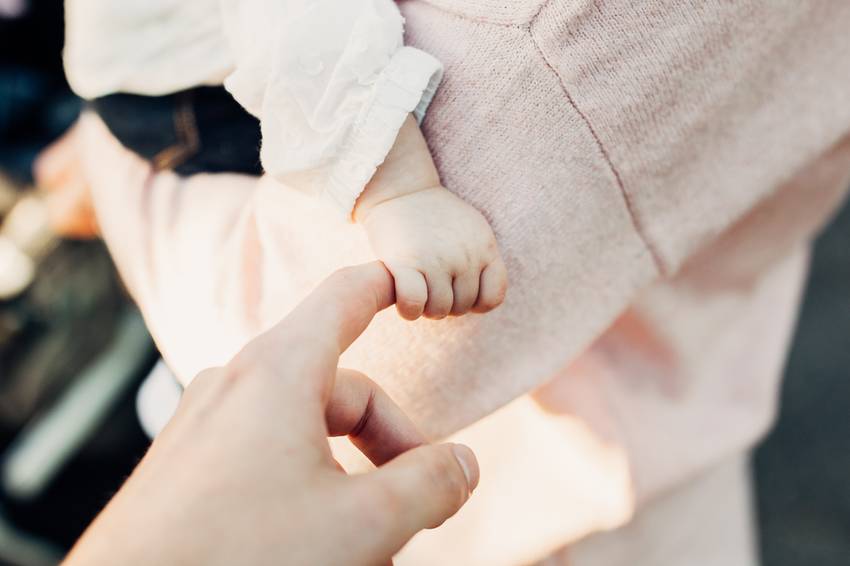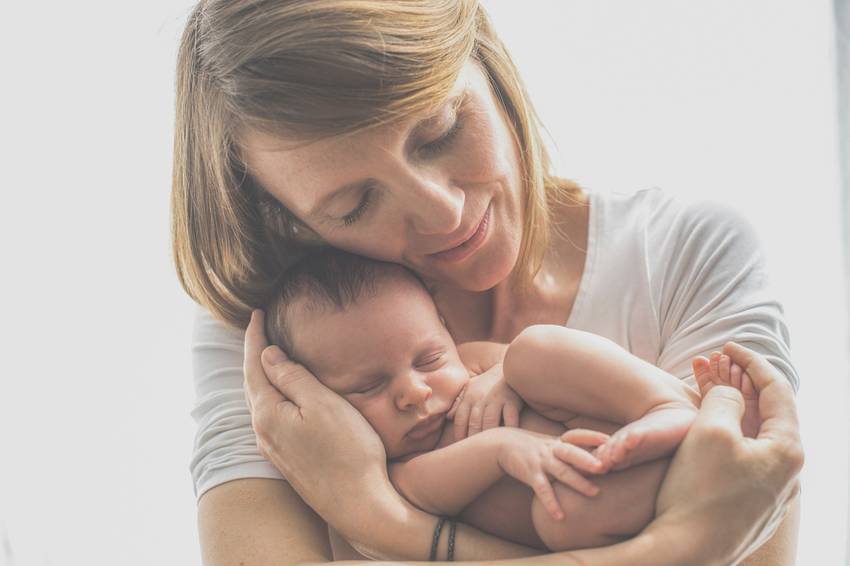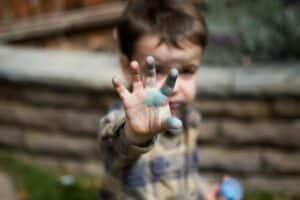As a mother, you know how precious and hilarious those moments can be when your baby gets ticklish. Watching the little one break into uncontrollable giggles is one of life’s simple pleasures.
But have you ever wondered when do babies get ticklish?
Around the age of 6 months, infants start developing an awareness of their surroundings and may show signs of being ticklish. When they’re touched in certain areas, such as the feet and stomach, they typically respond with a giggle or laugh. Responses can also include kicking legs and waving arms excitedly.
Let’s take a look at some key milestones in your baby’s development that should give an indication that they’re likely to start enjoying being tickled soon enough. Read on as we investigate this delightful topic together.

How Do Babies Perceive Tickles?
When young babies are first born, they aren’t capable of feeling tickles. Furthermore, babies are still learning about their bodies and linking them with various feelings. Newborn babies won’t be able to connect the person attempting to tickle them to touch sensations until later. As a result, they may not react as if they were tickled.
However, after several months and the touch has been imprinted in your baby’s brain, he or she may recognize a tickle sensation and connect it to the individual handling them.
Is It Harmful Or Beneficial To Tickle Babies?
Tickle may be harmful to younger infants if it is applied for a long period, and your baby isn’t capable of enduring it.
If a baby is being tickled too much, he or she may have difficulty burping afterward. Additionally, if little ones are tickled shortly after feeding, they may rebuke their dinner and feel uncomfortable.
Tickling babies might make matters worse if he or she is gassy.
Tickling your baby when done in moderation may be useful. In addition, this is how your infant will learn about his or her body map. Furthermore, it stimulates the senses for a tactile reaction, which is important in your infant’s growth.
Tickling is good for your infant’s brain since it stimulates cognitive development in youngsters by connecting the sensation with a person. This might give information to your baby’s mind to aid his or her growth. When your baby begins standing or walking, the connection of the mind and sensory perception may assist him or her.
When Do Babies Get Ticklish?
Babies usually become giggly at around the age of six months. By the time a newborn is 6 months old, he or she has developed full control over their sense of touch. They may feel ticklish sensations, and they are increasingly able to discern individual approaches to tickling them.
For the first year of life, a baby’s feet may be ticklish in the same region. Babies can tell who is tickling them and how they react if a stranger does it, which is why it’s important to teach infants not to trust strangers.
It’s possible that twins or multiple babies may not become ticklish at the same time. However, this is a developmental stage that newborns can go through at various ages. One twin or multiple might begin to sense tickle sooner than the other. It is still acceptable and does not imply that the other one is falling behind in terms of physical development.

Why Do Some Babies Don’t Get Tickled?
Babies, on the other hand, perceive things somewhat differently than we do. However, in their minds, an infant feels tickled by you rather than connected to you as an individual.
Consider this: babies separate the experience from the feelings. It’s like being in a pool and feeling wet but not knowing why. Babies will become ticklish, but it won’t be until they can link you to the tickling sensation. To elicit that smile or laughter you desire, the two must be linked.
How Does Tickling Impact The Brain?
The main aim of tickling is to help your baby learn about his or her visual external space as it pertains to his or her body, so keep that in mind while you’re tickling him. This implies you should constantly try to tickle your baby in various areas, not just on his or her toes.
Tickling also has benefits for the baby’s brain development. When you tickle different parts of your baby’s body, he or she will learn to develop a sense of where his or her limbs are in space. This is an important skill known as proprioception, and it helps with coordination and movement planning.
Proprioception is the ability to sense the position and location of our limbs in space without having to look at them. It’s what allows us to touch our noses with our eyes closed, for example. This awareness starts to develop in infancy, and proprioceptive input is crucial for normal motor development.
How To Safely Tickle Your Baby?
Here are some ways to stimulate your baby without causing him or her any harm:
- Interval training with a few distractions will keep you going strong.
- Don’t tickle your infant without pausing. While your child may appear to be joyful, he or she may already be having difficulties breathing and can’t inform you to relax.
- Do not tickle your child soon after feeding.
- Before attempting to tickle your baby, make sure he or she has burped.
- To develop speech abilities, talk to your baby while tickling him or her. When your baby is already gassy, do not tickle him or her.
- When your infant is having difficulties breathing, do not tickle him or her.
Top Tickle Spots
Now that you know when do babies get ticklish, it’s time to learn about the common tickle spots.
- The stomach: Have those tickle-fingers fly over Baby’s tummy for a unique kind of tummy time—it’s a tried and true approach that generally works somewhat, so it’s a safe bet if you’re ready to start experimenting with what makes Baby laugh the most.
- All the little piggies: When the final little piggy has just cried himself all the way home because tickling is a fantastic huge finish with a built-in song and dance, it’s time for some tickling.
- The neck: While the crook of Baby’s neck, right up to her ear is no doubt a lesser and less obvious target than the others, it’s nonetheless a promising location for some mild tickles.
- Under the knees: It’s not nearly as obvious, for example, as the scalp or a foot.
How To Tell If The Baby Dislikes Being Tickled?
When tickled, any baby older than six months old who dislikes it is likely to show the following sentiments and indications of annoyance.
- Grimacing and crying out of anguish.
- Trying to push your hand away and attempting to roll away are also responses.
- When a baby is tickled, it may crawl away.
- The Baby is crying.
When To Avoid Tickling The Baby?
- Disease or sickness.
- Not recommended during or after the feeding.
- A tired or drowsy baby is common.
- The Baby’s attention is occupied by something else.
Myths About Tickling
Tickling aids in the development of language: Tickling does not aid in the learning of words. Gentle tickling can help a couple form a physical bond, but it is ineffective for stimulating speech.
Tickling is not a cause of stuttering: there is no evidence that tickling causes stuttering. It’s possible that stuttering develops in toddlers due to a variety of reasons, ranging from familial history.
Tickling is a type of exercise that babies can do to burn calories. Tickling leads to laughter, which consumes calories. However, because the calories burned are insufficient, tickling isn’t an acceptable form of exercise for babies.
Other Ways To Make Babies Laugh And Bond With Them
If you’re looking for a way to make the baby laugh, consider the following alternatives.
- Play peek-a-boo and other games, such as trying to catch the baby while they crawl. These activities may induce giggles in the youngster while also improving their psychological development.
- A game of blowing bubbles and making strange noises might be a lot of fun.
- Make funny faces since it is known to elicit giggles from infants.
- Make noises that seem unusual, like the slurping of liquids or the sounds of animals, to elicit laughter.

Frequently Asked Questions
Q1: Is it okay to tickle a three-month-old baby?
Ans: Gentle tickling for your baby will have a beneficial impact on his disposition. For their physical development, parents and the child need to have a physical connection.
Q2: Is my two-month-old ticklish?
Ans: It doesn’t matter whether you tickle the toes of a newborn because all babies wiggle their feet in response.
Q3: When do babies laugh when tickled?
Ans: Around the age of four months, babies start to laugh when tickled, but it’s usually more of a reflexive response rather than an intentional one. By six months, most babies can laugh on purpose when they’re tickled.
Q4: Are babies ticklish in the womb?
Ans: Research suggests that fetuses may be ticklish in the womb, but it’s impossible to know for sure since they can’t communicate with us.
Q5: Can you tickle newborns?
Ans: When you tickle the toes of a newborn baby, it isn’t quite as pleasurable for them as it is for older children. This is due to fresh research that suggests babies in the first four months of life experience touching and moving their feet without connecting them to you.
Q6: Does tickling a baby cause speech problems?
Ans: Researchers have discovered that tickling your infant can aid in their communication development. Parents who tickle their children while speaking with them are more likely to recognize words in the continuous stream of speech.
Q7: Is it ok to tickle a 6-month-old?
Ans: Yes, it is okay to tickle a six-month-old baby. They will often giggle and laugh in response to being tickled. Be sure not to tickle them too hard, as they may become upset.
Q8: Does tickling baby feet cause stutter?
Ans: No evidence tickling baby feet causes stuttering. Stuttering is a speech disorder that can develop in toddlers for a variety of reasons, such as familial history.
Q9: Do babies only laugh when tickled?
Ans: No, babies laugh for a variety of reasons. They may laugh when they see something funny, when they’re playing with someone, or when they’re enjoying themselves.
Q10: When do babies start crawling?
Ans: Most babies start crawling between six and ten months old. Some may start as early as four months old, while others may not start until they’re a year old.
Conclusion
It is around the age of four months when babies start to laugh when tickled, but it’s usually more of a reflexive response rather than an intentional one. By six months, most babies can laugh on purpose when they’re tickled.
If you’re looking for a way to make the baby laugh, consider playing peek-a-boo and other games, making funny faces, or making noises that seem unusual. Tickling leads to laughter, which consumes calories; however, because the calories burned are insufficient, tickling isn’t an acceptable form of exercise for babies.







